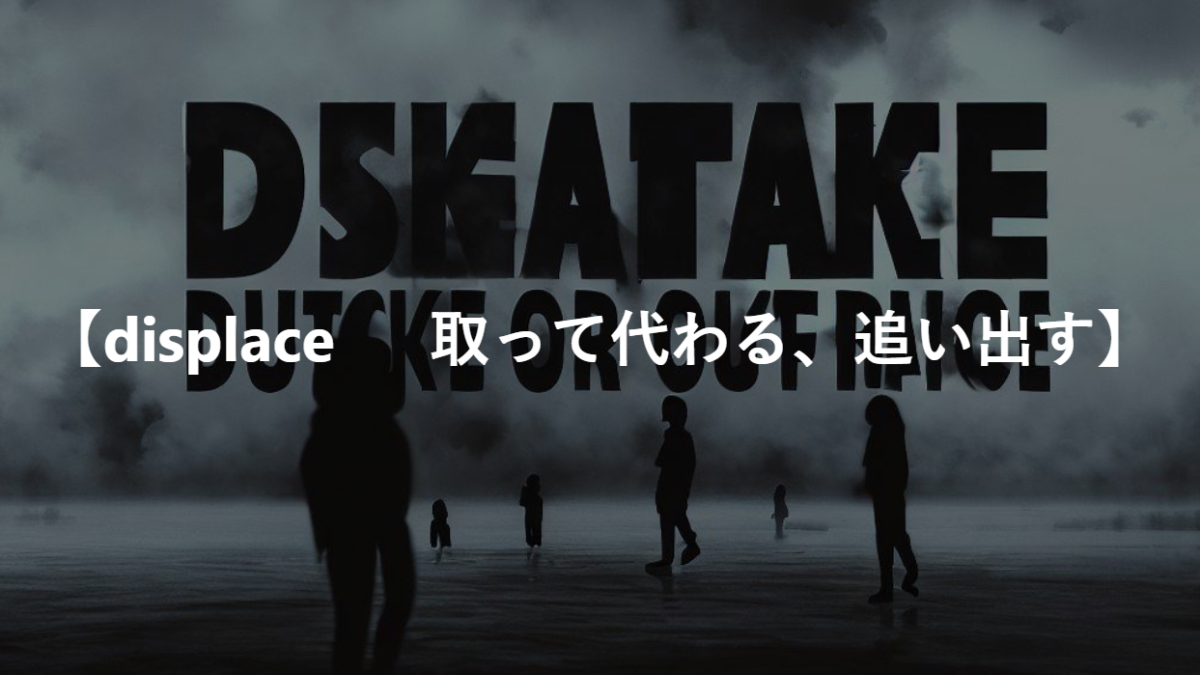語源・類義語・反対語・例文
【displace 取って代わる、追い出す】という単語の語源とか由来を知っていますか?
「Displace」という単語は、動詞で「取って代わる」や「追い出す」という意味を持ちます。この単語の語源は、中期英語の「displacen」にさかのぼり、それはさらに古フランス語の「desplacer」から来ています。ラテン語の接頭辞「dis-」(離れて、別々に)と「placere」(喜ばせる、満足させる)が組み合わさっており、文字通りには「場所から移動させる」や「位置を変える」という意味になります。
時が経つにつれ、「displace」の意味は進化し、「あるものを別の場所に移動させる」から、「あるものが他のものの場所を取る」や「何かをその位置や状態から追い出す」という意味に拡大しました。この単語は、物理的な移動だけでなく、社会的、経済的な文脈で使われることがあります。例えば、技術の進歩が既存の業務を「displace」する、つまり置き換える、といった使い方です。
The word “displace” is a verb meaning “to replace” or “to expel.” Its origins can be traced back to the Middle English word “displacen,” which further derives from the Old French “desplacer.” This is composed of the Latin prefix “dis-” (apart, asunder) and “placere” (to please, to satisfy), literally translating to “to move out of place” or “to change position.”
Over time, the meaning of “displace” evolved from “moving something to a different location” to encompassing “one thing taking the place of another” or “expelling something from its position or condition.” The word is not only used in the context of physical movement but also in social and economic contexts. For example, it might be used to describe how advancements in technology “displace” existing jobs, meaning they replace or displace them.
この単語の類義語・反対語を教えてください。
類義語
- Replace – 取り替える、代わりにする
- Supplant – 取って代わる、追い落とす
- Oust – 追い出す、排除する
- Eject – 放り出す、追い出す
- Expel – 追放する
- Usurp – 横取りする、奪う
- Overthrow – 打倒する、転覆させる
- Remove – 取り除く、移動させる
反対語
- Install – 設置する、就任させる
- Admit – 受け入れる
- Welcome – 歓迎する
- Retain – 保持する、維持する
- Reinstate – 復職させる、復帰させる
- Preserve – 保存する、保護する
- Accept – 受け入れる
- Embrace – 抱擁する、受け入れる
この単語に似た単語で間違いやすい単語はありますか?
- Replace – 「取り替える」や「代わりにする」という意味で、「displace」と非常に似ていますが、一般的には「displace」よりも中立的または積極的な状況で使用されます。例えば、壊れたものを新しいもので「replace」する、あるいは人が役割やポジションに「replace」されることは、単にその場所や役割を占めるという意味合いが強いです。
- Dislodge – 「位置から動かす」や「追い出す」という意味ですが、「displace」と比べて物理的な移動や強制を強調します。例えば、何かが固定された位置から「dislodge」される場合、それはしばしば力や努力を必要とする状況を指します。
- Supplant – 「取って代わる」や「置き換える」という意味で、「displace」と非常に似ていますが、既存のものを新しいものが巧妙にまたは徐々に置き換える状況を指すことが多いです。権力や地位の変化に関連する場合が多いです。
- Oust – 「追い出す」や「排除する」という意味で、「displace」と似ていますが、特に権力やポジションから誰かを強制的に取り除く状況に用いられます。政治的な文脈で使われることが多いです。
この単語を使った例文を5つほど教えてください。
The construction of the new highway will displace several families who have been living in the area for generations.
(新しい高速道路の建設により、何世代にもわたってその地域に住んでいた数家族が立ち退かされます。)
The company’s decision to automate production processes resulted in many workers being displaced and losing their jobs.
(企業が生産プロセスを自動化するという決定により、多くの労働者が追い出されて仕事を失いました。)
The flood forced thousands of residents to be displaced from their homes and seek temporary shelter.
(洪水のため、何千人もの住民が自宅を追われて一時的な避難所を求めることになりました。)
The arrival of the new supermarket in the neighborhood will likely displace several smaller local businesses.
(近所に新しいスーパーマーケットができることで、数軒の小規模な地元の事業が追い出される可能性があります。)
The invention of e-books has significantly displaced traditional print books in the publishing industry.
(電子書籍の発明により、出版業界では従来の印刷物の書籍が大幅に取って代わられました。)
【displace 取って代わる、追い出す】のコロケーション
- displace people – 人々を追い出す
- 自然災害や戦争、開発計画などによって人々が住む場所を迫られる状況を表します。
- displace workers – 労働者を置き換える
- 技術進歩や経済変動によって仕事が自動化されたり、他の場所に移されたりすることで、労働者が職を失う状況を指します。
- displace traditional methods – 伝統的な方法を置き換える
- 新しい技術やアイデアが古いやり方や技術を取って代わる状況を示します。
- displace water – 水を押しのける
- 物理学や工学で、物体が水に入ることで水が移動する現象を指します。アルキメデスの原理に関連しています。
- displace responsibility – 責任を転嫁する
- 責任や義務を他人に押し付ける行為を表します。
「Displace」という単語は、人々や物事が元の場所や状態から取り除かれるさまざまな状況を表すために使われます。この言葉は、変化や移行の瞬間を捉え、特に人、物、方法、さらには責任までもが新しい状況や条件に置き換えられる場合にその力を発揮します。では、この単語の使用法を探るために、「displace」の典型的なコロケーションをいくつか見てみましょう。
まず、「displace people」は、自然災害や戦争、開発計画などによって、人々が住む場所を失う状況を指します。これは、社会的、経済的な影響が大きく、深刻な人道的問題を引き起こすことがあります。
次に、「displace workers」は、技術の進歩や経済の変化によって、従来の仕事が自動化されたり、他の場所へと移されたりすることで、労働者が職を失う状況を示します。これは、労働市場における大きな変革を象徴しています。
「displace traditional methods」は、新しい技術やアイデアが古いやり方を置き換える場合に使われます。このコロケーションは、進歩の過程で伝統がどのように進化するかを示しています。
物理学や工学の文脈では、「displace water」は、物体が水に入ることで水が移動する現象を指します。この表現は、アルキメデスの原理などの科学的原則を理解するのに役立ちます。
最後に、「displace responsibility」は、個人や組織が自分たちの責任や義務を他人に押し付ける行動を指します。これは、社会的、職業的な文脈での責任の放棄や転嫁を示しています。
これらのコロケーションを通じて、「displace」がどのように使われるかを理解することは、変化の瞬間を記述する際の言葉の選択に深みと精度をもたらします。それは、私たちが目の当たりにする社会的、経済的、技術的な変化を表現するための強力なツールとなり得ます。
The word “displace” is used to describe various situations where people or things are removed from their original places or states. This term captures moments of change or transition, especially when individuals, objects, methods, or even responsibilities are replaced by new conditions or situations. Let’s explore some typical collocations of “displace” to understand how this word is utilized.
Firstly, “displace people” refers to situations where individuals lose their places of residence due to natural disasters, wars, development projects, and the like. This can have significant social and economic impacts, leading to serious humanitarian issues.
Next, “displace workers” indicates scenarios where traditional jobs are automated or relocated due to technological advancements or economic shifts. This symbolizes major transformations in the labor market.
“Displace traditional methods” is used when new technologies or ideas replace old ways of doing things. This collocation demonstrates how tradition evolves in the face of progress.
In the context of physics or engineering, “displace water” refers to the phenomenon where water is moved by an object entering it. This expression helps in understanding scientific principles, such as Archimedes’ principle.
Lastly, “displace responsibility” describes the action of individuals or organizations shifting their duties or obligations onto others. This points to the avoidance or transfer of responsibility in social or professional contexts.
Understanding the usage of these collocations with “displace” adds depth and precision to our choice of words when describing moments of change. It becomes a powerful tool for expressing the social, economic, and technological transformations we witness.
displaceを使った文法問題
- The new technology is expected to _____ many traditional jobs in the manufacturing industry.
- (A) displace
- (B) displacement
- (C) displaced
- (D) displacing
解答と解説: (A) displace
解説: is expected to do ~ で「~することが期待される」という意味になります。to不定詞の後なので動詞の原形であるdisplaceが適切です。
- The earthquake and subsequent tsunami _____ thousands of people from their homes.
- (A) displace
- (B) displacement
- (C) displaced
- (D) displacing
解答と解説: (C) displaced
解説: 地震と津波が人々を家から「追い出した」という過去の事実を表すため、過去形のdisplacedが適切です。
- The company’s decision to automate its production line will result in the _____ of several workers.
- (A) displace
- (B) displacement
- (C) displaced
- (D) displacing
解答と解説: (B) displacement
解説: result in the displacement of ~ で「~の移動、追放という結果になる」という表現になります。
- The rise of online shopping has _____ traditional brick-and-mortar stores in many industries.
- (A) displace
- (B) displacement
- (C) displaced
- (D) displacing
解答と解説: (C) displaced
解説: オンラインショッピングの台頭が従来の実店舗を「取って代わった」という過去の事実を表すため、過去形のdisplacedが適切です。
- The government’s new housing policy aims to prevent the _____ of low-income residents.
- (A) displace
- (B) displacement
- (C) displaced
- (D) displacing
解答と解説: (B) displacement
解説: prevent the displacement of ~ で「~の移動、追放を防ぐ」という表現になります。

